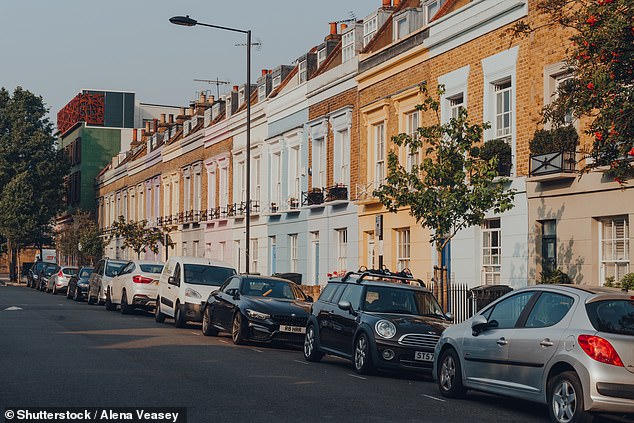House prices have reached a new record high, according to the latest figures from mortgage giant Halifax, but it said property prices are only inching up
Halifax said the typical home increased in value by 0.3 per cent in August, with house prices rising for the third month in a row, to reach £299,331.
The report bucks the gloom surrounding the housing market at the moment, which has focussed on falling house prices in expensive areas such as London and the South East.
The figures are based on Halifax’s own lending data, so will reflect lower mortgage rates helping buyers borrow more.
But Britain’s biggest mortgage lender said that the rise in average house prices this year has been just £600.
The average house price is now 2.2 per cent higher than a year ago. However, while property values across the board rose last month, Halifax revealed the average price paid by first-time buyers actually fell slightly.
The typical first-time buyer property now costs £237,577, down 0.6 per cent since May, the month after a big rise in stamp duty costs kicked in for new homeowners.
‘The story of the housing market in 2025 has been one of stability,’ said Amanda Bryden, head of mortgages at Halifax.
‘Since January, prices have risen by less than £600, underlining how steady the market has been despite wider economic pressures.
‘For those able to overcome the hurdle of saving a deposit, the numbers increasingly stack up.
Buying remains cheaper than renting, even for those with larger mortgages. A typical first-time buyer purchasing their first home with a 5 per cent deposit and a 30-year mortgage term, is likely to pay around £1,180 a month compared to the average private rent of £1,343.
North/south divide continues
House prices continue to rise in the north of England.
House prices in the North East, North West, and Yorkshire and the Humber all rose by above 4 per cent on average, making them the fastest-rising regions.
However, the South West saw prices fall 0.8 per cent over the past year, while prices are only up by 0.8 per cent year-on-year.
The capital remains the most expensive part of Britain, with an average property value of £541,615.
Northern Ireland continues to be the fastest growing region when it comes to house prices. Average property values there are up 8.1 per cent over the past year.
Meanwhile, Scotland saw the next strongest annual increase with prices rising 4.9 per cent in August to an average of £215,594.
‘In some parts of the country the number of sellers far outstrips the number of serious buyers,’ said Jonathan Hopper, chief executive of Garrington Property Finders.
‘Average prices fell in South West England over the past 12 months, as large numbers of second homes and holiday let properties were put up for sale by their disenchanted owners. Prices have been creeping up in London and the commuter belt, but by tiny amounts.
‘Northern Ireland and Scotland are still seeing prices rise at a decent clip, but overall the market is settling into a period of modest price growth. The annual rate of price inflation is half what it was a year ago.’

The capital remains the most expensive part of Britain, with an average property value of £541,615
What next for house prices?
Halifax is expecting house prices to rise, abeit slowly from here.
Amanda Bryden of Halifax added: ‘Affordability remains a challenge, but there are signs of improvement. Interest rates have been on a gradual downward path for nearly two years, and many of the most competitive fixed-rate mortgage deals now offer rates below 4 per cent.
‘Combined with strong wage growth – which has outpaced house price inflation for nearly three years – this is giving more prospective buyers the confidence to take the next step.
‘Supported by improving affordability and resilient demand, we expect to see a slow but steady climb in property prices through the rest of this year.’
However, not everyone is convinced prices will rise from here, not least due to all the property tax speculation surrounding the upcoming budget.
There have been rumours in recent weeks that Labour could seek to make sweeping changes to stamp duty and capital gains tax.

Buying agent Jonathan Hopper, chief executive of Garrington Property Finders
This uncertainty has led to some agreed sales in August falling through, according to one estate agent.
Martyn Gerrard Estate Agents, which has 15 offices in London, says buyers are pulling out within a week or two of their offer being accepted.
Higher up the property ladder, where purchases are more likely to be discretionary, many buyers are adopting a ‘wait and see’ approach as rumours swirl about major tax changes coming in the Autumn Budget,’ added Jonathan Hopper, chief executive of Garrington Property Finders.
‘Against that uncertain backdrop, buyers’ offers tend to reflect these unknown risks.
‘Deals are still being done, but only pragmatic sellers are likely to succeed in what is set to be a very price-sensitive autumn market. On the price front, autumn will be about balance, not boom or bust.’
Tom Bill, head of residential research at Knight Frank also things the tax rumours will likely have some impact.
He said: ‘Although there is a risk that some buyers and sellers hesitate ahead of the Budget, which would increase downwards pressure on prices, others may be keen to accelerate their plans, which would have the opposite effect.
‘It will depend on whether people are more focussed on possible changes to stamp duty or capital gains tax. The former feels too difficult to attempt and the latter feels politically toxic.’
#House #prices #rise #month #row #reach #record #high #Halifax


